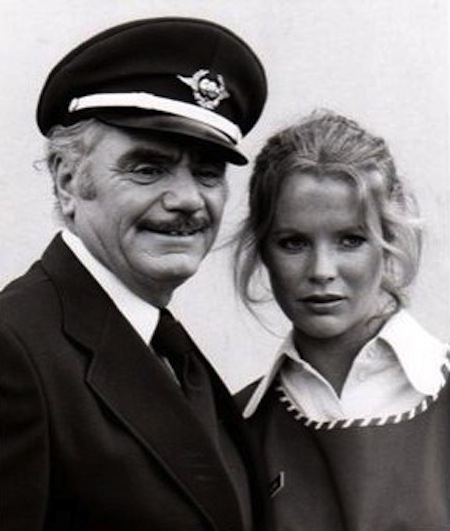Given their low budgets and quick turnaround
times, TV movies have always been able to jump on both cultural trends and
ripped-from-the-headlines stories more easily than theatrical features. That's one
reason why numerous ’70s telefilms dramatize sensationalistic events with
supernatural connotations. “Weird news” items lacking the factual foundation
and/or social significance to merit feature treatment were ideal fodder for movies
of the week. All of this should set the proper context for The Ghost of Flight 401, a slight but somewhat thoughtful riff on strange phenomena that followed the crash of a commercial airliner in
Florida. In real life, people reported hearing, seeing, and even smelling the
ghost of the doomed plane's copilot long after he died from injuries sustained
in the crash.
After the usual gravitas-laden opening narration warning viewers
that what they're about to see maybe-kinda-sorta could have actually happened,
the picture introduces veteran flyer Dom Cimoli (Ernest Borgnine), a likeable
family man with a weakness for Bay Rum cologne. Despite a premonition from his
wife that something bad is about to happen, Dom joins the cockpit crew of a
plane that suffers landing-gear failure, loses altitude, and crashes in the
Everglades. Among the few survivors is flight attendant Prissy Frasier (Kim
Basinger). She and others who knew Dom sense his presence in the days and weeks
after the crash, first by catching a whiff of Bay Rum and then by actually
seeing his physical body for fleeing moments. Airline administrator Jordan
Evanhower (Gary Lockwood), an avowed agnostic, dismisses the sightings as mass
hysteria, so when Prissy swears she encountered the deceased Dom on a night flight,
Jordan tells her she needs to see a shrink before returning to duty.
Eventually, enough people report sightings that Jordan is forced to broaden his
horizons, leading to a kicky final act.
As directed by the capable Steven
Hilliard Stern, The Ghost of Flight 401
doesn't break ground in terms of otherworldly thrills. Instead, the film
effectively depicts the emotional states of otherwise rational people who
encounter things beyond their understanding. Stern guides actors toward
restrained, tense performances, and cinematographer Howard Schwartz bathes
everything in evocative shadows that Stern maximizes with elegant camera moves.
Calling The Ghost of Flight 401 a cut
above the normal made-for-TV fare would be exaggerating, and it's worth noting
that Borgnine's screen time is limited (although Basinger, in one of her
earliest roles, is quite prominent). Nonetheless, the respectful way that the
filmmakers explore such pseudoscientific concepts as pscyhometry makes The Ghost of Flight 401 more ruminative
than exploitive.
The
Ghost of Flight 401: FUNKY


2 comments:
I have a fairly vivid memory of seeing this movie, but do not remember Basinger (a Caucasian blond) as the lead in the film. I really thought the main female character was an Asian gal. Maybe I'm mixing up my late 70's "Ghost on a Plane" telefilms?
It was later exposed that the events of the book this film was based on were entirely fictionalized after the actual crash. None of the reported reuse of parts nor the sightings occurred.
The actual disaster itself was explored in a film from later that year called Crash starring William Shatner. The show piece of that film was its frighteningly realistic crash sequence depicting the plane breaking apart and debris and passengers still strapped into seats hurtling through the air amidst the everglades.
Post a Comment